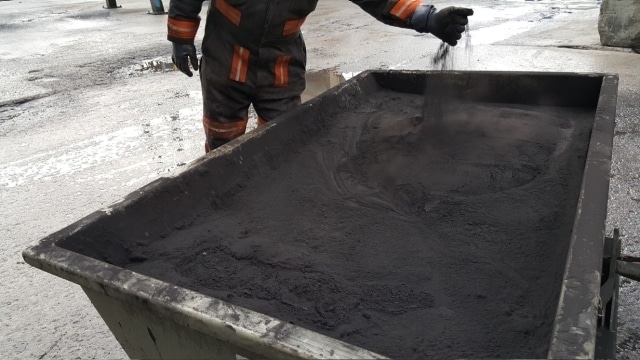Mar 16 2016
Virginia Tech engineers have developed a new technique to recover precious rare earth minerals from coal and coal byproducts. The team has collaborated with industry and academic partners in a major pilot project, which aims to extract rare earth elements from coal waste.
 Virginia Tech engineers have developed a way to extract valuable rare earth minerals from coal and coal byproducts. Eventually they hope to construct a mobile pilot plant in Southwest Virginia. (credit: Virginia Tech)
Virginia Tech engineers have developed a way to extract valuable rare earth minerals from coal and coal byproducts. Eventually they hope to construct a mobile pilot plant in Southwest Virginia. (credit: Virginia Tech)
The supply of essential materials has become increasingly limited, and they are needed to develop a wide range of products; from windmills to smart phone. The $1 million pilot project is partly funded by a U.S. Department of Energy National Energy Technology Laboratory grant.
Roe-Hoan Yoon, a University Distinguished Professor and the Nicholas T. Camicia Professor of Mining and Materials Engineering, explained that as part of this project, Virginia Tech scientists will test a patented process called hydrophobic-hydrophilic separation (HHS) technology, in order to exploit the properties of water-resistant and water-friendly materials to recover rare earth elements from coal byproducts.
The study is headed by Rick Honaker, principal investigator and professor and chair of the University of Kentucky’s Department of Engineering. He received his graduate and undergraduate engineering degrees at Virginia Tech. Other contributors of the study include scientists from West Virginia University as well as representatives from five corporate partners.
According to the researchers the ongoing project is of major significance, because of the increasingly short supply of rare earth materials. These materials are required to make strong permanent magnets in a variety of products, such as electric motors, and PC hard drives to name a few.
The clay from the Jiangxi Province of South China is considered to be the best source of higher value rare earth elements, although it has been reported that these resources will deplete within a span of two decades. The new research has shown that coal could serve as a good source of rare earth minerals.
The majority of rare earths is produced in China as byproducts. With the recent closure of the rare earth mine in California, the U.S. relies more heavily on imports. It will be good for the country if we can develop an advanced separation technology to extract the critical materials from coal as byproducts, particularly the high-value rare earths essential for advanced manufacturing industries.
Roe-Hoan Yoon, Professor, Virginia Tech
The researchers added that the problem related to domestic production not only impacts issues regarding the development of renewable energy resources, but it also affects national security.
Domestic supply of rare earth materials is critical for the U.S. manufacturing industry. As the nation moves toward electric-drive vehicles, wind farming, and other sustainable energy measures, it is important to develop a reliable source of essential materials. In addition, we will develop new, cleaner applications for coal and coal byproducts to revitalize the mining industry.
Morgan Griffith, Virginia’s 9th District Representative, U.S. House of Representatives
According to the U.S. Geological Survey Coal Quality Database, the U.S. has as much as 10.9 million tons of rare earth reserves in coal deposits, situated in just four eastern and five western states, including Virginia, West Virginia, and Kentucky,
Yoon will be joined by Gerald Luttrell, the E. Morgan Massey Professor of Mining and Materials Engineering, to carry out Virginia Tech’s role in the pilot project.
Apart from the academic partners, the researchers will also team up with industry partners - Blackhawk Mining, Arch Coal, Bowie Refining, Minerals Refining Company, and Eriez Manufacturing – for the project.
If the ongoing Phase I pilot project is successful, the team will seek out additional funds for the Phase II project, which will involve design and testing of a mobile facility at various coal cleaning centers located in the central Appalachian coalfield.